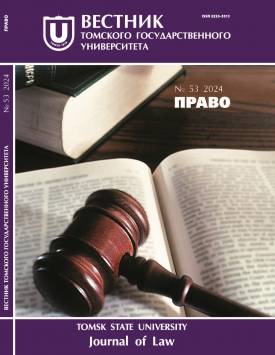Protection of honour and dignity of a judge in criminal proceedings against him or her
Criminal proceedings against judges is a serious problem that has not only a complex legal, but also ethical and applied nature, because the public importance of criminal proceedings, involving the use of coercive measures, deprivation of immunity, significantly affects the special procedural status of judges, and criminal prosecution reduces public confidence in the judiciary. Due to these circumstances, the purpose of this article is to find ways to achieve a balance of public principles and private interests. The solution of the problem identified in the article was carried out on the basis of official data of published judicial practice, including - on the resources of information and telecommunication network ‘Internet’, as well as on the analysis of scientific research of domestic scientists. The use of methods of scientific analysis, generalization, comparison and legal modeling allowed the authors to gradually explore and propose a solution with scientific and practical significance to the following problematic issues related to the criminal prosecution of judges: a) restoration of the rights and protection of the honor, dignity and business reputation of judges illegally prosecuted; b) protection of honor and dignity, as well as ensuring the safety of judges against whom a guilty verdict has entered into force, c) activation of the activities of the state and bodies of the judicial community to strengthen and practically implement guarantees of the independence of judicial bodies, respect and compliance with its constituent requirements, as well as maintaining organizational and legal guarantees of the independence of judges, exceptions illegal influence on them when making decisions, including from the position of judicial discretion; d) identification and analysis of the reasons for the illegal criminal prosecution of judges, as well as the proposal of ways to eliminate such situations. The authors come to the following conclusions: 1) cases of convictions against specific judges should not be broadly interpreted as discrediting the entire judicial corps of Russia; 2) criminal prosecution of a judge should not justify any actions aimed at humiliating the honor and dignity of a judge, as well as questioning his business reputation (especially in the media and before sentencing) such actions should be suppressed, and those responsible for their commission should be brought to justice); 3) it is unacceptable to diminish the authority and importance of justice, the prestige of the judicial profession, and a decrease in the level of trust. The authors declare no conflicts of interests.
Keywords
court, judiciary, business reputation, honour, dignity, criminal prosecution, independence, inviolabilityAuthors
| Name | Organization | |
| Epikhin Alexander Yu. | Kazan Federal University; Kazan Branch of the Russian State University of Justice | doc@epihin.ru |
| Tasakov Sergey V. | Chuvash State University named after N.I. Ulyanov | tasakov@mail.ru |
| Grishina Ekaterina P. | Russian State University of Justice | Grishina.K.ru@yandex.ru |
References

Protection of honour and dignity of a judge in criminal proceedings against him or her | Tomsk State University Journal of Law. 2024. № 53. DOI: 10.17223/22253513/53/3
